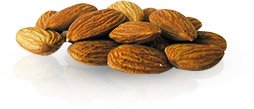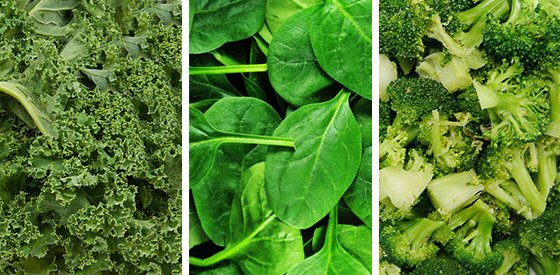Taking the first step toward a healthier lifestyle can be overwhelming, but eating healthy doesn't have to mean drinking your weight in protein powder or downing a dozen egg whites for breakfast. If you're looking to reclaim your health—or simply boost your activity levels—realize that simple changes are enough to spell success. Making smart swaps in the kitchen and lacing up your walking shoes more frequently can be a great start. Use these 40 tips as a roadmap for change on the path toward a healthier you.
Avoid Refined, Flour-Based Foods
Cutting out refined, flour-based products can redefine your diet. These foods are so processed that they're usually devoid of any real nutritional content. Nixing them will not only help you maintain a more stable blood glucose and a healthier body weight, but you'll have more room for nutrient-dense foods packed with vitamins and minerals. Trade in the sugar rush (and resulting crash) you get from that glazed jelly donut for more nutritious options like fresh fruits, vegetables, and whole grains.
Take Fish Oil
Fish oil may help combat depression, heart disease, and type 2 diabetes. It may also help lower your risk of cancer and improve body composition. Given all those potential pluses, fish oil is one supplement no one should skip. Aim for 3-6 grams per day depending on how frequently you consume fatty varieties of fish.

Drink Green Tea
Filled with powerful antioxidants, green tea may help ward off certain diseases and keep you feeling your best. Green tea is rich in catechins (antioxidants which fight and may help prevent cell damage). Green tea has also been shown to help prevent heart-related issues such as high blood pressure and congestive heart failure. Green tea can also boost metabolism, sending your calorie burning soaring. Take plain water to the next level by quenching your thirst with 2-3 cups of green tea daily.
Bask In The Sun
Let a little sun shine down. Natural sunlight is a great way to boost your body's vitamin D levels. Vitamin D helps ensure that bones are formed properly and can also help ward off depression. Try to soak up 15-20 minutes of sunlight daily.
Don't Fill Yourself To The Brim
We live in a world where many of us constantly eat—even when we're not hungry. Fight the need to feed. By eating slightly under maintenance at all times, you help to stop fat gains from creeping on. That way, if you happen to have a day where you overeat, the lower calorie days you've had will help compensate for it.
Do HIIT Cardio
High-intensity exercise not only provides great physical boosting benefits, but also helps combat stress by releasing feel-good endorphins in the body. At least 20-30 minutes of high-intensity exercise three times per week should produce optimal results.

Sleep 8 Hours Each Night
Sleep is critical to feeling your best, maintaining good health, promoting a healthy body weight, and reducing the signs of aging. Yet, most people short-change their shuteye. Commit to getting 8 hours of sleep each night and, if you have the time, catch some extra Z's on the weekend. You'll be amazed what this little change will do to how you feel on a day-to-day basis.
Strengthen Your Social Bonds
A strong circle of friends can do more than boost your social status. As noted in "Psychosomatic Medicine," having a good dose of social support can help ward off depression and heart disease. Make sure to foster a few very close relationships and spend time with those people regularly.

Don't Forgo The H2O
When it comes to hydration, think quality not just quantity. Stay hydrated with the right beverages. Choose clear water more regularly. It's the best way to detoxify your system and make sure you cleanse waste from the body. Really can't stand the taste of plain old H2O? Squeeze in a bit of fresh lemon. Aim for at least 8 glasses daily.
Veg Out Once A Week
No, I don't mean lying around on the couch and tuning out with a pint of Ben and Jerry's. I'm talking vegetables. Properly planned vegetarian diets tend to be lower in saturated fat and calories than diets of the carnivorous kind. Still, you don't always have to forgo your favorite steak to reap the benefits. Start slow. Try trading in meat for protein-filled legumes once or twice a week.
Pass On Processed Protein
A diet rich in deli meat, sausages, and bacon is also a diet rich in nitrates and preservatives. This is a major no-no for anyone interested in becoming healthier. Pass on the processed whatyamacallits that will likely load your system up with toxins and may lead to disease over time, and stick to natural forms of protein only.
Meditate More

Meditation is more than just a great way to reduce stress. According to a study in the "American Journal of Psychiatry," meditation can also help treat anxiety-related disorders. Devote 10-15 minutes per day to sitting quietly to meditate or simply be with your own thoughts. In the busy pace of life, taking time to just be still is essential.
Don't Over-Medicate
Don't routinely rely on over-the-counter drugs for minor aches and pains. When possible, make proper diet and rest your first defense. For your next line of defense, seek out natural remedies. When using medication, follow a doctor's guidance.
Start The Day With A Well-Balanced Breakfast
How you start your day sets the tone for everything that follows. Kick things off the right way with a balanced meal. That will help keep your blood sugar levels stabilized throughout the morning. You'll be less likely to hit up the vending machine after that afternoon meeting. Ideally, breakfast should blend of all three macronutrients—proteins, carbohydrates, and dietary fats.

Eat More Berries
Loaded with antioxidants, fiber, and vitamins, berries are among the healthiest fruits you can consume. Blueberries and raspberries are particularly packed with free radical fighters, but any berry can make a great addition to your daily diet plan. Try adding them to your morning smoothie, mixing them in as part of a seasonal fruit salad, or eating them whole as a mid-morning snack.

Eat The (Natural) Rainbow
Colorization isn't just for old movies and Civil War photos—it's great for your diet, too. A diet that's rich in colorful, nutrient-dense fruits and vegetables helps ensure that youe take in a full spectrum of vitamins and minerals.
Get Hooked On Fish
Fish is one of the healthiest protein sources you can add to your diet, yet far too many people aren't consuming it regularly enough. Serve up fish such as salmon and sardines, which respectively pack 1,210 mg and 1,950 mg of omega-3 per 3-ounce serving. Additionally, choose lower mercury white fish varieties such as tilapia to keep your calorie count down.
Focus On Moving More
So many people erroneously believe that they have to work out in a gym for it to be considered "exercise." Change your frame of mind. Any form of movement will help you reach your fitness goals—whether it takes place outside, in your home, or at the local shopping mall as you window shop. Simply focus on moving more and you'll be off to a great start.
Find An Activity You Love
It's important that you have a "flow activity," an activity you can easily get lost in to de-stress. This activity should be one where you lose track of time and are entirely absorbed in whatever that activity happens to be. Doing your "flow state" activity weekly is one of the best ways to enrich your life and help to combat built-up tension.

Eat Carbs Low On The Glycemic Index
According to a study in the "American Society for Clinical Nutrition," a diet rich in foods with a low glycemic index is one of the best ways to promote a lower risk of heart disease. Focus on adding plenty of fresh fruits, vegetables, whole grains, beans, lentils, and nuts into your diet rather than refined carbohydrate choices.
Strength Train

Strength training is one of the best ways to fend off added fat gain and help ensure that your bones stay strong. Whether you prefer kettlebells, free weights, machines, or barbells, make sure you strength train at least three times a week. Regularly integrate strength-based exercises into your routine for positive rewards.
Add In The Olive Oil
Olive oil is light tasting and versatile, making it a win-win. Another benefit? It's packed with monounsaturated fatty acids and antioxidants that may help lower your risk of cancer and heart disease. According to the "American Society for Clinical Nutrition," diets rich in olive oil help increase life expectancy when combined with plenty of fresh fish, produce, and the absence of processed grains. Drizzle oil over your salad or add it to your stir-fry to lower your risk of heart disease and possibly improve your cholesterol profile.

Allow Cheat Meals
While it's essential that you focus on eating as healthy as possible the vast majority of the time, don't be afraid to indulge on occasion. It helps you maintain a healthy frame of mind around food, and reduces the chance of disordered eating. If you eat well 90 percent of the time, indulging 10 percent of the time won't set you back. Designated weekly cheat windows could enhance your results and make you more likely to stick to your diet the rest of the time.
Ditch The "Forever" Diet
When you diet, your metabolism slows down to some degree. The longer you diet, the greater the slowdown. Never stay on a diet for longer than 6-8 weeks at a time. Taking a break will allow you to ramp up your metabolism so that when you return to monitoring your calorie intake, you see significant weight-loss results.
Get Your Annual Physical
While it might feel like a nuisance, a yearly examination is a must if you hope to maintain your overall health and well-being. Going for a medical examination can help you spot potential problems before they arise and take preventative action to stop any issues that may lurk.

Journal Regularly
Taking the time to journal can be one of the most effective ways to purge pent-up emotions and channel them into something productive. It's a great way to relieve stress and get your feelings out. Awaken your inner voice and take a few minutes to journal daily.
Slather On The Sunscreen
Don't be fooled. You should be using sunscreen even when it's not sunny out, and I'm not just talking about the tanning bed. According to the Centers for Disease Control and Prevention, UV rays from the sun can reach you on cloudy, overcast days as well. Use a sunscreen with SPF 15 or higher to help avoid sun damage, cancer risk, and premature wrinkles.
Laugh
Laughter might really be the best medicine. One study published in the "International Journal of Cardiology" noted that people who were less likely to experience laughter during the day were at an increased risk for coronary heart disease. Laughter's also an excellent mood booster. So go ahead and laugh out loud!
Improve Your Posture
Poor posture will make you appear heavier than you are, can also put you at risk for developing lower back pain, and may contribute to fatigue. Suffering from a slump might also cause neck and shoulder pain, leading to tension headaches. Bad desk posture is especially common. Alleviate this and fix your form by setting a timer. Signal it to go off once every hour. When it signals, perform a quick posture check to see where you stand. Some cues to look for: butt back, shoulders straight, hips evenly aligned.
Read Regularly
Nix late-night TV and make a more concentrated effort to read daily. Whether you opt for fiction, non-fiction, or a magazine, any form of reading will help strengthen your mental health and keep your mind young.

Stay Stimulated
Working out your mind is just as important as working out your body. Just as you should be making an effort to eat right and exercise, you should also be making an effort to keep learning. The minute you stop learning is the minute you accelerate the process of aging. A young mind is one that has a never-ending thirst for knowledge. Keep your mind sharp. Consider learning another language, taking up an instrument, or sitting down with the Sunday crossword. Then go exercise.
Cut Back On Caffeine
While drinking a daily cup of coffee or two a day can boost your health, when this daily cup turns into five—or is paired with other forms of caffeine on a regular basis—the health benefits can turn to risks. People who consume too much caffeine daily are going to be at risk for higher levels of anxiety, headaches, energy highs and lows, and higher levels of stress and burnout. Start weaning yourself of one cup at a time.
Veg Out On Veggies
Consider non-starchy vegetables a free food. You simply can't get enough—so eat up. Then, when you think you've had enough, eat a little more. Vegetables are one of the best foods to boost your nutrient intake, promote greater feelings of satiety, help banish hunger, and improve weight loss. Just be sure that you aren't cooking them using high-calorie sauces or condiments. Instead, consider flavorful, low-calorie hot sauce or veggie-filled salsa.
Snack On Nuts—But Don't Go Nuts

Nuts are a fantastic snack to have throughout the day, provided you keep your portion sizes under control. They are rich in healthy fats, contain a good dose of dietary fiber, and will help you stay satiated. Consider snacking on an ounce of walnuts to get in some omega-3 fatty acids, a handful of lutein-rich pistachios, or a one-ounce serving of almonds, which contains 37 percent of your daily dose of vitamin E.
Indulge In Dark Chocolate
No, this doesn't give you the green light to down a bag of midnight Snickers. But, if you often suffer from chocolate cravings, indulge in one square of dark chocolate daily. Dark chocolate that's at least 60-70 percent cocoa has high flavonoid concentrations that can help your health. Giving yourself permission to indulge might help you maintain course the rest of the time, keeping your calorie intake in check.

Stretch It Out
Despite the clear benefits, stretching is something that most of us don't do often enough. Stretching increases flexibility, and improves circulation, balance, and coordination. Take 10 minutes out each day to stretch and breathe deeply. It'll help you de-stress, keep your energy levels up, and help to reduce muscle tension and tightness.
Ax Artificial Sweeteners
While avoiding sugar is imperative, don't think that replacing that sugar with artificial sweeteners is any better. These man-made chemicals might put you at an increased risk of headaches, anxiety, and gastrointestinal issues. Basically, you won't feel as good as you potentially could.
Learn Your Body
If there's one golden rule to remember about diets, it's that there are no set-in-stone rules. What might be an incredibly effective diet for one person could be disastrous for another. Everybody's unique. While some commonalities such as a proper calorie and sufficient protein intake are essential to all diets, there's room for individualization. Learn your body and adjust from there. It's the best way to guarantee progress.
Go Green
Make green, leafy vegetables mainstays in your diet. Three leafy greens that you can't get enough of are kale, spinach, and broccoli. They're loaded with antioxidants, fiber and the vitamins K, C, and A. Kale contains more iron than beef. Plus, these power veggies come virtually calorie-free.

Walk More Often
Walking shouldn't be your only form of exercise, but it can be a great way to burn a few extra calories and keep moving. It's an easy form of exercise that can be done daily. In addition to being low-intensity and easy on the joints, walking boosts heart health, burns calories, improves cardiovascular conditioning, and strengthens your bones.
References:
- Gomer-Orth, K. et al. (1993). Lack of social support and incidence of coronary heart disease in middle aged Swedish men. Psychosomatic Medicine. Vol. 55, No. 1.
- Effectiveness of a meditation-based stress reduction program in the treatment of anxiety disorders. (1992). The American journal Of Psychiatry. Vol. 149, No. 7.
- Leeds, A. (2002). Glycemic Index And Heart Disease. American Society For Clinical Nutrition. Vol. 76, No. 1.
- Drescher, G. et al. (1995). Mediterranean diet pyramid: a cultural model for healthy living. The American Society for Clinical Nutrition. Vol. 61, No. 6.
- Clark, A. et al. (2001). Inverse Association Between Sense Of Humor And Coronary Heart Disease. International Journal Of Cardiology. Vol. 80, Issue 1. Pp. 87-88.
